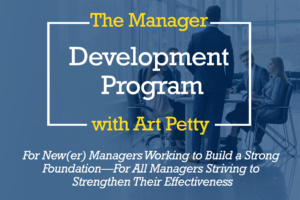How do we help our new managers cross the chasm from contributor to manager successfully?
One of the vexing career challenges any individual encounters is the shift from contributor to manager. There’s little about succeeding as a contributor that translates to guiding, coaching, and supporting others for success. This is a key part of manager development.
Moving to your first management role is a decision to put what’s worked for you on the back burner and learn a whole new set of skills. As management researcher and author Linda A. Hill offers: “Becoming a new manager is a transformational experience for which there are no shortcuts.” My translation of that statement is: it takes time, experience, and many mistakes. And, if you buy into Gallup’s survey numbers and conclusion, managers are primarily responsible for at least two-thirds of employees in our organizations being disengaged.
We need an operating system to guide new manager development.
As someone who has managed, selected, and developed new managers and trained and coached thousands in the past decade, how to help individuals move from contributor to successful manager has been the goal and the search. A few years ago, a colleague challenged me to create a framework to help new managers and their promoting bosses simplify and guide this “no shortcuts” transition. “We need a blueprint or roadmap that gets beyond the typical job description and truly helps guide and accelerate the development of new managers,” she offered.
The result is the Managers Operating System™ (MOS). I introduced this framework in several articles published via SmartBrief on Leadership. The most recent, Rethinking The Managers Operating System, outlines 10 core “programs” incorporating behaviors and approaches that must be present and interoperating to build a healthy working environment. (See the complete listing of the programs in the SmartBrief article.)
Several of the programs are foundational, including ensuring role clarity (#1), jump-starting trust via Swift Trust practices (#2), and collaborating with the manager’s team to define the “Rules of the Road” or working values (#3). These foundational activities are complemented by 7 additional “programs” the manager must bring to the working environment daily.
“Wow, that’s a lot!”
When I introduce the MOS in programs or via coaching engagements, a common reaction is, “Wow, that’s a lot to think about and do.” That’s not wrong. Serving as an effective manager—one that promotes engagement, supports the manager development of great people, and generates creative problem-solving, innovation, and high performance- is darned hard work. The payoff from implementing the MOS is all of these and then some.
What the managers operating system offers managers of new managers:
Having struggled with and navigated the work of selecting and manager development for many years in the tech sector, I empathize with every manager of managers striving to do the same. Historically, there’s been no blueprint, roadmap, or GPS (choose your flavor) to help. There is now, and the MOS offers guidance and areas to focus on essential for starting and building success for both the promoting and newly minted managers.
- There’s guidance on the foundational activities essential for creating new manager credibility and team member engagement from day one.
- The foundational activities of role clarity, clear group values, and the emergence of trust are all research-backed practices essential for high performance to emerge.
- The communication, context-sharing, connection cultivating, and teaching elements of the MOS (and then some) are integral to promoting engagement and pursuing results.
- The MOS provides the promoting manager with a teaching and coaching tool that focuses time and energy on the right behaviors and activities.
Benefits of the manager’s operating system for new managers
While the benefits of the MOS are powerful and tangible for promotions and manager development, the real payoff comes from giving new managers context for success, focus, direction, and accountability.
- The need to gain clarity on their role and, importantly, what their current team needs from the manager is job 1.
- The importance of helping the team move beyond the early awkward phase of “What does this rookie manager mean for me” is inherent in practicing Swift Trust behaviors.
- The power of building shared values together on what it means to be a part of the team and singling out what’s expected from each other for accountability, support, feedback, and others catalyzes the emergence of a healthy working environment.
- The communication, context-setting, and coaching priorities outlined in the MOS promote the right behaviors to create engagement, performance, and growth.
The Bottom Line for Now—Making a Tough Job Easier
I’m on a one-person mission to build the next generation of effective managers—the kind who transform organizations, enable success, and inspire individuals for a generation. The Managers Operating System is effectively a set of tools and behaviors organized into a framework to help push that mission forward for all of us. A lot more goes into manager development and creating effective, successful managers, but this is a powerful, immediately actionable starting point. Now, about the new manager selection process…
![]()
Register for one of the upcoming sessions of The Manager Development Program and bring The Managers Operating System to life in your organization.








Leave A Comment